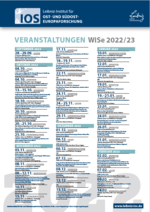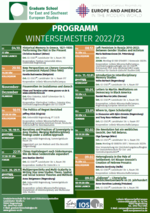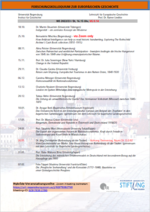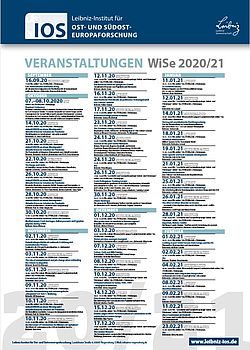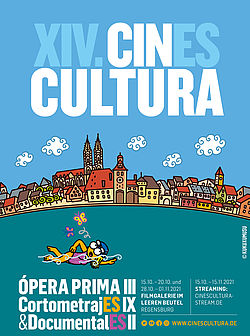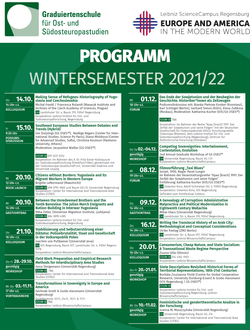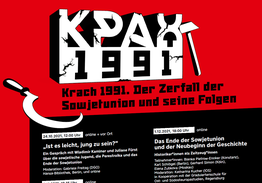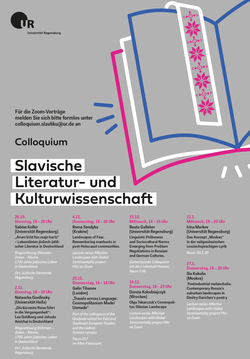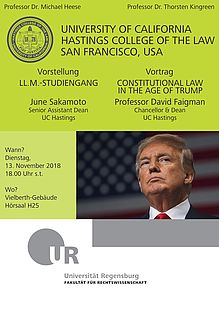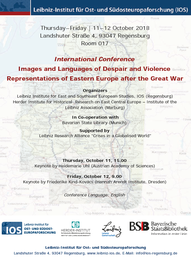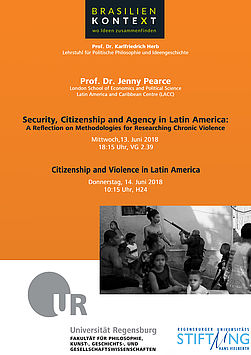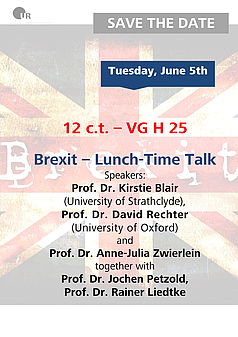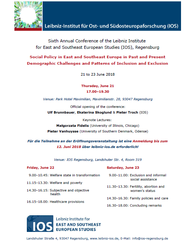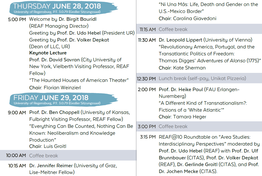
Partners' Events on Area Studies
Area Studies is represented in Regensburg by a rich array of institutions and initiatives.
Please see the German page for a full list of current events and an archive of all past events in both languages.
Regensburg European-American Forum offers numerous events in English.
The Research Colloquium at the Chair of European History at UR offers a regular series on Tuesdays, 16:15, with some talks in English.
The posters below link to some events taking place this semester, while there is information on upcoming and past events below.
Wintersemester 2022/23
Current Events
Weds 14.12. Matthias Morys (York)
Did Living Standards actually improve under State Socialism? Evidence from Bulgaria, 1944-1989
We challenge the view that Centrally Planned Economies functioned well until the early 1970s, delivering high economic growth and better living standards. A novel data set of alternative living standard indicators (wages, caloric intake, etc.) shows that only in the 1970s did Bulgarian living standards surpass levels achieved already four decades earlier. We also show that structural change had progressed by the late 1930s to a degree that the country would, in all likelihood, have industrialised further anyway, possibly akin to neighbouring Greece. Big Push industrialization after 1946 reduced economic welfare in addition to coming at high human and societal cost.
Das WIN - Zentrum zur Förderung des wissenschaftlichen Nachwuchses - lädt zum Vortrag in der Reihe Regensburg Research Hour ein. Am Mo 12.12.2023, 17-18 Uhr, online, Frau Dr. Tatiana Klepikova zu Gast, die über "Jenseits der Homophobie: Warum man LTBTQ+-Kulturen in Osteuropa erforschen sollte" sprechen wird. Zielgruppe der Reihe sind alle Interessierten innerhalb und außerhalb der UR, die sich für das jeweilige Thema interessieren. Weitere Informationen und der Link zum Meeting finden sich hier https://go.ur.de/researchhour
Tatiana Klepikova | Jenseits der Homophobie: Warum man LGBTQ+-Kulturen in Osteuropa erforschen sollte
Mo. 12.12,, 17-18 Uhr, online - Details hier: https://www.uni-regensburg.de/forschung/zentrum-nachwuchsfoerderung/kalender/index.html?tx_news_pi1%5Baction%5D=detail&tx_news_pi1%5Bcontroller%5D=News&tx_news_pi1%5BhideDate%5D=0&tx_news_pi1%5Bnews%5D=18500&tx_news_pi1%5BsimpleList%5D=0&cHash=70f564402243fb0a0f927ff3c814a806
Queere Kulturen stellen eine der größten Lücken in unserem Wissen über die Vergangenheit dar. Der Grund hierfür besteht in einer langen Kriminalisierung und Pathologisierung der öffentlichen und privaten Darstellung des LGBTQ+-Selbst in der ganzen Welt. In diesem Vortrag wird der Blicke auf solche Lücken in den ehemaligen sozialistischen Ländern Osteuropas gerichtet: Was wissen wir über die LGBTQ+-Vergangenheit in der Region? Wie wird der Mangel an Wissen darüber durch rechtspopulistische Bewegungen in der Region manipuliert, um Schutz vor „nicht-traditionellen Werten“ zu rechtfertigen und Gesetze und Initiativen gegen LGBTQ+-Personen in Gang zu bringen? Und was hat der Krieg in der Ukraine mit Gay-Bewegungen zu tun? Letztlich, was haben die Künstler:innen, die mit queeren und/oder LGBTQ+-Ästhetiken arbeiten, in der Vergangenheit gemacht, um ihre Stimmen in die Öffentlichkeit zu tragen? Und was machen sie heute?
IOS Vortragsreihe | Natur und Umwelt in Ost- und Südosteuropa. Bedrohung, Potentiale, zivilgesellschaftliches Engagement
Diese Vortragsreihe, organisiert von Dr. Edvin Pezo, startet am 23. November, 18 Uhr mit einem Online-Votrag von Ulrich Eichelmann (RiverWatch) zum Thema "Das Blaue Herz Europas - die Balkanflüsse zwischen Schutz und Zerstörung". Es geht weiter am 7 Dezember, auch Online, mit Christoph Promberger und seinem Vortrag zu den Rumänischen Karpathen. Die Reihe schließt am 18. Januar, 18:00 am IOS (Raum 107) Joanna Maria Stolarek (Warschau) ab mit einem Vortrag zur Umweltproblematik in Polen. Die Zugangsdetails und weitere Information finden Sie hier.
Die GS OSESUR - freut sich auf eine erneute Kooperation mit dem FilmFestival Cottbus und dem Ostentor-Kino, in deren Rahmen zwei feministische Filme vorgeführt werden. Diese sind Teil der Filmreihe "Frauenrollen im Sozialismus und danach".
https://www.gsoses-ur.de/events-and-news/detail/frauenrollen-im-sozialismus-und-danach
Montag, 5. Dezember, 19 Uhr
SOMETHING DIFFERENT [O NĚČEM JINÉM]
Věra Chytilová, Tschechoslowakei 1963, Spielfilm, 82 Min.
In Originalsprache mit englischen Untertiteln
Begrüßung: Sabine Koller (Universität Regensburg)
Einführung: Marek Nekula (Universität Regensburg)
Filmbeschreibung:
Zwei Frauen – zwei unterschiedliche Welten. Eine Hausfrau, die mit ihrem Haushalt, Kind und dem gleichgültigen Ehemann zugleich überfordert und gelangweilt ist. Eine Spitzensportlerin, die für einen Wettkampf unablässig trainiert. Aus der Montage zweier Frauenleben entsteht etwas Neues, etwas anderes ….
Montag, 12. Dezember, 19 Uhr
BLINDFOLD [IZ ZAVYAZANYMY OCHYMA]
Taras Dron, Ukraine 2020, Spielfilm, 100 Min.
In Originalsprache mit englischen Untertiteln
Begrüßung: Sabine Koller (Universität Regensburg)
Einführung: Julia Herzberg (LMU München)
Filmbeschreibung:
Yulia ist eine erfolgreiche Sportlerin, eine Mixed Martial Arts-Kämpferin. Als sie erfährt, dass ihr Freund im Krieg in der Ostukraine gefallen ist, verändert sich ihr Leben schlagartig. Die Öffentlichkeit erwartet von ihr, den Trauerschleier zu tragen und von nun an in der Rolle der Witwe eines Kriegshelden aufzutreten. Aber Yulia will ihr Leben und ihre Rolle selbst bestimmen.
Filme und Termine unter www.ostentorkino.de
Partners' past events - Winter semester 2022/23
PROF. DR. MIRJA LECKE (Slavistik) invites you to join the online talk
The More Who Die, the Less We Care: Confronting the Deadly Arithmetic of Compassion and the World’s Urgent Problems
by Prof. Paul Slovic, University of Oregon, and Scott Slovic, University Distinguished Professor of Environmental Humanities at the University of Idaho
23.11.2022, 19.00 hrs (CET):
Mirja Lecke is part of the organizing committee of a broader event on The Anthropocene: from boundaries to bonds: Interdisciplinary crossovers in knowledge development organized with Academia Europaea Wrocław Knowledge Hub, Olga Tokarczuk Ex-Centre, Academic Research Centre and the University of Wrocław
Details of the talk and how to access it via Zoom can be found here. A poster is attached.
EUROPAEUM - Series of talks with Ukrainian researchers
The Europaeum East-West Centre at UR is organizing a second round of lectures with Ukrainian researchers. Four of the five lectures in this series will be in English, one in German. The programme is attached, while the zoom link together with abstracts can be found here www.europaeum.de. The first talk is on
Weds, 23.11.2022 with Dr. Kateryna Busol: The challenges of documenting and prosecuting atrocity crimes in the Russia-Ukraine armed conflict since 2014
Im Wintersemester setzen das EUROPAEUM und BAYHOST die Online-Vorlesungsreihe „Wissen.Forschung.Innovation: Ukrainische Wissenschaftlerinnen stellen ihre Themen vor“ fort.
Seit Beginn des leider noch immer andauernden russischen Angriffs auf die Ukraine mussten auch viele Wissenschaftler:innen ihr Land verlassen. Einige von ihnen können bei uns in Deutschland ihre Forschungsarbeit fortsetzen. Um zu erfahren, mit welchen Themen sich ukrainische Wissenschaftler:innen beschäftigen und um ihnen Kontakte zu hiesigen Kolleg:innen zu verschaffen, stellen fünf Forscherinnen aus der Ukraine ihre derzeitigen Themen vor.
Wir sind uns sicher, dass die Themen, die diesmal allesamt einen Bezug zur aktuellen Situation oder der Geschichte der Ukraine haben, ganz besondere Einblicke in das Land vermitteln werden.
Die Vorlesungen finden online per Zoom statt. Wir würden uns sehr freuen, wenn Du auf diese Reihe über euren Verteiler hinweisen könntest.
Nähere Informationen, die Termine und Zugangsdaten findest Du unter www.europaeum.de. Ein digitales Poster ist angehängt.
ZENTRUM ERINNERUNGSKULTUR und JUNIORPROFESSUR für PUBLIC HISTORY
Einladung zum Vortrag: M. Saryusz-Wolska "Non-human actors in Memory Making", 24.11.2022, 16:15, PT3.0.77
Im Kolloquium „Public History und Erinnerungskultur“ diskutieren wir mit erfahrenen Wissenschaftler*innen neue Ansätze der Erinnerungskulturforschung und besprechen Abschlussprojekte von Studierenden des MA-Studiengangs "Public History und Kulturvermittlung“.
Im Rahmen des Kolloquiums spricht Dr. hab. Magdalena Saryusz-Wolska vom Deutschen Historischen Institut Warschau zu
Non-human actors in Memory Making
Cultural memories do not emerge out of nowhere. Social actors who shape them act in certain material environments. Writing a memoir requires paper and pencils, at least. Monuments need proper places and durable materials. Museums need money, legal bases, exhibition spaces and technologies. The lecture presents a micro-historical approach to analyze the agency of non-human actors who contribute to the construction of cultural memories.
Wann: Donnerstag, den 24.11. 2022, 16:15 Uhr
Wo: Universität Regensburg, Raum PT 3.0.77
Der Vortrag findet in englischer Sprache statt.
Weitere Termine finden Sie hier:
https://www.uni-regensburg.de/philosophie-kunst-geschichte-gesellschaft/public-history/lehre/index.html
Das Kolloquium ist eine gemeinsame Veranstaltung der Juniorprofessur für Public History und des Zentrums Erinnerungskultur und wird von Dr. Bianca Hoenig und Prof. Dr. Juliane Tomann geleitet. Wir freuen uns auf Ihre Teilnahme.
Gerlinde Groitl invites you to two lectures by the visiting professor Ryoko Nakano (Kanzawa University) that take place next week, on 6 and 7 December. She will address aspects of memory culture and soft power in East Asia in on ttalk, and Japanese perspectives on geopolitics and identity in the other.
Tuesday, 6.12.2022, 14:15-15:45, Room: H23
Prof. Dr. Ryoko Nakano, Kanazawa University, Japan: Cultural heritage conflicts in East Asia
Guest lecture as part of the cizrse "Einführung in die IP" by PD Dr. Gerlinde Groitl
Abstract: Cultural heritage has entered the center stage of diplomacy in East Asia. How to interpret World War II and the era before this remains a contentious topic in the region. Without much consensus over the memories of the modern era, state and nonstate actors in East Asia use UNESCO’s heritage lists/registers to promote a particular view of the war and related history internationally. In this seminar, Dr. Nakano introduces cultural heritage as an important asset of soft power for emerging states that seek national prestige and recognition on a world stage. She argues that heritage conflicts are not just about heritage, but they are part and parcel of soft power competitions and power-political conflicts (sometimes described as regional power competitions). The elements of this process are illustrated through the study of three cases: Japan’s “Sites of the Meiji Industrial Revolution,” China’s “Document of Nanjing Massacre”, and the “Voices of ‘Comfort Women’” promoted by the Korean civil society group. Those cases illustrate that both state and nonstate actors are involved in heritage conflicts because heritage is grounded in the set of cultural practices, knowledge, and history in a community of the people.
Wednesday, 7.12.2022, 10:45-11:45, in Room DE 2.121 (Biologie-Gebäude)
Prof. Dr. Ryoko Nakano, Kanazawa University, Japan: Japanese perspectives on international order: geopolitics, geoeconomics, and national identity
Guest lecture as part of the seminar "Großmachtkonkurrenz: Russland, China und der Westen" by PD Dr. Gerlinde Groitl and the research colloquium Prof. Dr. Stephan Bierling
Abstract: In the rising perception of the liberal international order in crisis, Japan’s claim to the Free and Open Indo-Pacific signals that Japan is a staunch defender of the existing international order in its alliance with Western democratic countries. However, Japan is not a mere supporter of norms and institutions developed under the auspices of the United States. Dr. Nakano highlights Japan’s active agency in conceptualizing an international order in ways that accommodate both the needs of Japan’s geopolitical and geoeconomic interests and the desires of Japanese conservatives to achieve a respectful nation status in the world. As marked by its promotion of comprehensive security and human security, Japan has developed its strategic thinking that emphasizes the importance of non-military security cooperation and a less interfering approach to human rights than Western democratic countries. From a position lacking a full-fledged military power in an increasingly interdependent world economy, strengthening alliance and security partnerships, reinforcing the current legal and normative orders, and avoiding outright confrontations with emerging powers are important pillars of foreign policy directions. To meet those demands in a changing international environment with rising China, Japan has expanded its geographical scope beyond East Asia.
Mark Spoerer invites you to talks taking place as part of the lecture series on Social and Economic History
Wednesdays 18:00-20:15 Uhr, Raum VG 1.30 or via Zoom:https://uni-regensburg.zoom.us/j/99496312592
Weds 07.12. Marie Huber (Berlin)
Postkoloniale Utopien? Unternehmerische Erwartungsbildung am Beispiel der multinationalen Fluglinie Air Afrique
In den 1960er und 1970er Jahren war es schwierig, Prognosen über die Zukunft des Luftverkehrs zu treffen. Dennoch waren sich die Fluggesellschaften und die Internationale Zivilluftfahrt-Organi-sation im Grundsatz einig, dass die bis dahin „spektakuläre“ Entwicklung anhalten würde. Für die neuen nationalen Fluggesellschaften vieler erst kürzlich unabhängig gewordenen Länder Afrikas und Asiens war eine besondere Form der Erwartungsbildung ausschlaggebend: utopische Erwar-tungen an eine wirtschaftliche Entwicklung, die durch nation-building und regionale Politik erreicht werden sollte. Im Vortrag werden die ersten 15 Jahre der Erwartungsbildung der multinationalen Air Afrique eingehend untersucht. Es wird gezeigt, dass utopische Erwartungen, die sich auf Appelle an die panafrikanische Solidarität und politische Programme der jungen postkolonialen Regierungen stützten, im Mittelpunkt vieler Geschäftsentscheidungen standen.
Partners' past events - Winter semester 2021/22
Regensburg-Rijeka Lectures: New Trends in Southeast European Studies
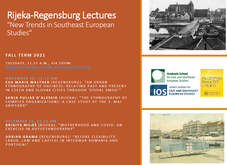 On 16 November and 14 December, starting 11:15, there will be online sessions involving scholars from the two centres, discussing cutting-edge research in Southeast European Studies. The programme is available here to download.
On 16 November and 14 December, starting 11:15, there will be online sessions involving scholars from the two centres, discussing cutting-edge research in Southeast European Studies. The programme is available here to download.
The discussions will cover themes including urban aesthetics, motherhood, shipyards and labour law.
Partners' past events - Winter semester 2019/20
The Seminar of the Economics Section at IOS has numerous events in English, icluding lectures on conflict in Ukraine, British detention camps in Kenya, migration and health care. Researchers from universities from around the world contribute to the series, which is held on Tuesdays from 13:30 to 15:00 at IOS (Room 109). The programme can be found here.
The research laboratory on Southeast and East European history and anthropology will host regular seminars on Thursdays from 14:00-16:00 throughout the semester. The programme can be found here.
Partners' past events - Summer semester 2019
Ongoing until 9 May - CinEsCultura Film Festival - Our friends at the Spanish Research Centre are currently hosting their annual film festival, with a focus this year on Chile.
Europe Week from 7 May – Our friends at the Europaeum – East-West Centre will launch their series of Europawoche events on 7 May. This year the focus is on Romania, with a host of discussions, lectures and films, as well as culinary delights, to be enjoyed throughout the week.
On Tuesday 14 May, Jennifer Keating (University College Dublin) will speak at the research seminar of the chair of European History on "Anti-colonial rebellion and political ecology: The Russian civil war in Central Asia, 1916-1920". The event takes place in the Vielberth Building, VG2.39 starting at 16:15.
The IOS Annual Conference will take place from 23-25 May 2019 - Firms and Social Change in Eastern and Southeastern Europe: Historical, Political and Economic Perspectives. The full programme can be found here.
The Regensburg Lectures on Eastern Europe included one event co-organized with CITAS, the discussion with Lauri Mälksoo and Gesine Dornblüth on 25 April. The series will continue with further discussions on the situation of academia in Hungary, Hungary’s relations to Europe and the situation in eastern Ukraine. The full programme can be found here.
Lecture Series – Migration and Education (Migration und Bildung). On selected Wednesdays throughout the semester, a lecture series organized by Prof. Dr. Meiser Munser-Kiefer take place at 18:00 in Lecture Theatre H3. Among those contributing is Ulf Brunnbauer, chair of the CITAS Executive Board. His lecture on 17 July will discuss fears of migration currently expressed in Eastern Europe. The full programme can be found here.
On September 23-24 the Serbian-Bavarian Higher Education Day, coordinated by our colleagues at Bayhost, will take place in Bamberg. The event aims to develop cooperation in research and teaching between the countries both in natural and engineering sciences and humanities and social sciences. The programm can be found here.
REAF Research Afternoon
REAF cordially invites you to join us for our Research Afternoon on 18 July 2019, in Room PT 3.0.79 (Großer Sitzungssaal) from 2-5pm!
REAF is delighted to welcome back Professor Dr. Jeannette E. Jones and Professor Dr. Alexander Vazansky from the University of Nebraska-Lincoln for this Research Afternoon.
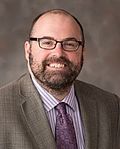 | We are looking forward to Prof. Dr. Alexander Vazansky's talk, titled "'I'll Bleed for Myself:' Black Power and Anti-Vietnam Activism in the U.S. Army in Germany." |
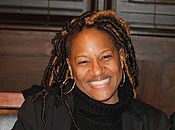 | We are also looking forward to a Research Roundtable with Prof. Dr. Jones. In a conversational setting, she will introduce her own research and discuss the state, role, and future of American Studies and academia in current political climates. Students will also be given the chance to informally talk about their own research interests. |
The Research Afternoon Program is as follows:
| 2:15 | Welcome |
| 2:30 | Prof. Dr. Alexander Vazansky—“’I’ll Bleed for Myself:’ Black Power and Anti-Vietnam Activism in the U.S. Army in Germany.” |
| 3:45 | Coffee Break |
| 4:00 | Research Roundtable with Prof. Dr. Jeannette E. Jones |
| 5:15 | Reception |
Partners' past events - Winter semester 2018/19
- Institute for East and Southeast European Studies (IOS) - Events in Winter Semester 2018/19
- Graduate School for East and Southeast European Studies (GSOSES) - Winter Semester 2018/19 - full list of events
- GSOSES Forum
- Regensburg Lectures on Eastern Europe
- Research Laboratory on History and Social Anthropology of East and Southeast Europe organized by the chair of Southeast and East European History in cooperation with IOS and GSOSES
- Europaeum
- REAF - Regensburg European American Forum
- The Professor of International Relations
- Guest lectures will include retired Lieutenant General Ben Hodges (former commander of the US Army Europe USAREUR, 2014-2017): Transatlantic Relations Today,Gespräch mit Prof. Bierling und den Studenten; 15.01.19
- The full programme can be found here as a PDF.
- The Chair of European History: Research Colloquium
- This series includes several English-language presentations, including talks on Garibaldi and Great Britain, Elvis Presley in the Cold War, and Georgian Jews' migration.
- The full programme can be found here.
23-25 November 2018, Landshuter Str. 4, Room 017
Between National and Transnational Memory Narratives
The research network „Grenze/n in nationalen und transnationalen Erinnerungskulturen" (Border/s in national and transnational memory cultures) and the Bohemicum are organizing a conference featuring several talks in English. The programme can be found here.
The keynote lecture is organized in collaboration with the Forum series at the Graduate School for East and Southeast European Studies. Petra James (Brussels) will present a lecture titled "The Spectre and the 'Haunting Past': Literary Representations of Central European Dictatorships of the 20th Century". She is a lecturer in literary studies specializing in East-Central Europe. The lecture is at 17:00 on 23 November.
Lecture. 13. November 2018, 6 pm, H25 Vielberth Gebäude, Universität Regensburg
Professor David Faigman Chancellor & Dean UC Hastings - "Constitutional Law in the age of Trump"
The Faculty of Law receives a delegation from the University of California, Hastings College of Law, San Francisco, including Chancellor and Dean Professor David Faigman, who will give a lecture on “Constitutional Law in the Age of Trump”. Furthermore, students will be introduced to Hastings College's LL.M. program.
14 November 2018, 2-4pm, UR ZH 5
REAF Roundtable with Dr. Jennifer Reimer
REAF - Regensburg European American Forum - invites you to a Roundtable with Dr. Jennifer Reimer (Lise-Meitner Fellow at the University of Graz) on "Perspectives and Politics of (Transnational) American Studies".
Dr. Reimer is also giving a presentation during the *gesellschaft macht geschlecht* events titled "Gender and Migration: Women, Sex(uality) and the Global Economy" on 14 November, 6 pm in H3, Universität Regensburg.
25-27 October 2018, Historisches Kolleg, Kaulbachstr. 15, Munich
5th Annual Conference: Graduate School of East and Southeast European Studies

"Studying East and Southeast Europe as Area Studies: Paradigms, Themes, Methods for the 21st Century" is the title of the fifth annual GSOSES conference. Keynote lectures will be held by Diane Koenker (SSEES, London) on "Encounters with Others: Tourism and Internationalization of Soviet Cuisine" on 25 October at 17.00 and by Frank Hadler (Leipzig) on "How to Study Eastern Europe as a Global Area" on 26 October at 17.45.
The full programme can be downloaded here.
11-12. OCtober 2018. IOS, Landshuter Str. 4, ROOM 017;
Conference: Images and Languages of Despair and Violence. Representations of Eastern Europe after the Great War
IOS in cooperation with the Herder Institute (Marburg) and the Bavarian State Library (BSB) organized a conference on the visual cultural history of representations of Eastern Europe after WWI.
The programme can be found here
Partners' past events - Summer semester 2018
12. June, 18.00, UR Kunsthalle (above Foyer Audimax/Bücher Pustet)
Volker Depkat "American Exceptionalism: Book project presentation and roundtable discussion.

Prof. Dr. Volker Depkat will present his new book project on American Exceptionalism. It will be followed by a roundtable discussion featuring the President of the University of Regensburg Prof. Dr. Udo Hebel, Prof. Dr. Stephan Bierling and Prof. Dr. Ben Chappell (American Studies, University of Kansas; Fulbright Visiting Professor).
The event is organized by the Regensburg European American Forum (REAF). The discussion will take place in English
13 June, 18.15, Vielberth-Gebäude 2.39 and 14 June, 10.15, Vielberth-Gebäude H24
Two lectures on violence and citizenship in Latin America by Prof. Dr Jenny Pearce (LSE)
On 13 June at 18.15 (VG 2.39) Prof. Dr Jenny Pearce (LSE, London) will give a lecture on "Security, Citzenship and Agency in Latin America" followed by another on 14 June at 10.15 (VG.H24) on "Citizenship and Violence in Latin America".
The lectures have been organized by Prof. Dr Karlfriedrich Herb (Political Philosophy and the History of Ideas) and are supported by the Vielberth-Foundation. The lectures are part of the "Brasilien Kontext" series.
5 June 2018, 12.00, VG. H. 25
Brexit - Lunchtime Talk
Prof. Dr. Anne-Julia Zwierlein (British Studies, Regensburg) and Prof. Rainer Liedtke (European History, Regensburg) invite you to a Lunchtime Talk on Brexit. Participating in the discussion are Prof. Dr. Kirstie Blair (Head of the School of Humanities, University of Strathclyde) and Prof. Dr. David Rechter (Professor of Modern Jewish History, University of Oxford).
The talk will take place in English and will be moderated by Prof. Dr. Jochen Petzold (British Studies, Regensburg).
21-23 June 2018, IOS, Landshuter Str. 4, Regensburg
IOS - Institute for East and Southeast European Studies, Annual Conference 2018: Social Policy in East and Southeast Europe in Past and Present Demographic Challenges and Patterns of Inclusion and Exclusion
The sixth IOS Annual Conference begins on 21 June 2018 at 17.00 with lectures by Małgorzata Fidelis (Department of History, University of Illinois, Chicago) and Pieter Vanhuysse (Department of Political Science and Public Management, University of Southern Denmark). CITAS Executive Committee member and IOS Director Ulf Brunnbauer will give the opening remarks.
The event continues on 22 and 23 June with a series of panels on social policy in East and Southeast Europe. The full programm can be found here. The event will be held in English.
REAF @ 10. 28-29 June 2018
Regensburg European American Forum celebrates its tenth anniversary
Our friends at the Regensburg European American Forum are celebrating their tenth anniversary on 28-29 June with a programme of lectures, talks and discussions addressing a broad range of transnational, Transatlantic and global themes. The opening keynote lecture by David Savran (CUNY) will take place at 17:00 on 28 June.
The members of the CITAS Executive Committee are delighted to have been invited alongside Volker Depkat to participate in a roundtable discussion on Area Studies: Interdisciplinary Perspectives on 29 June at 15:15. It wil be moderated by the President of the University of Regensburg, and REAF founder, Prof. Dr. Udo Hebel.


